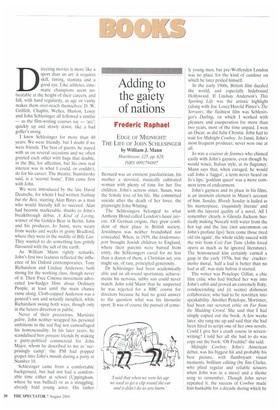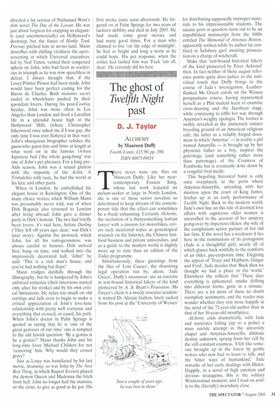Adding to the gaiety of nations
Frederic Raphael
EDGE OF MIDNIGHT THE LIFE OF JOHN SCHLESINGER by William J. Mann Hutchinson, £25, pp. 628, ISBN 0091794897
Directing movies is more like a sport than an art: it requires skill, timing, stamina and a good eye. Like athletes, cinematic champions seem unbeatable at the height of their careers, and fall, with hard regularity, as age or vanity makes them over-reach themselves: D. W. Griffith, Chaplin, Welles, Huston, Losey and John Schlesinger all followed a similar — as the film-writing courses say — 'arc': quickly up and slowly down, like a bad golfer's swing.
I knew Schlesinger for more than 40 years. We were friendly. but I doubt if we were friends. The best of guests, he stayed with us on several occasions and we often greeted each other with hugs that double, in the Biz, for affection, but his own real interest was in what I could, or couldn't, do for his career. The theatre, Stan islavsky said, is a 'second home'. Film came first with John.
We were introduced by the late David Deutsche, for whom I had written Nothing but the Best, starring Alan Bates as a man who would literally kill to succeed. Alan had become marketable, thanks to John's breakthrough debut, A Kind of Loving, winner of the Golden Bear in Berlin. John and his producer, Jo Janni, were weary from weeks and weeks in grimy Bradford, where they were in the middle of Billy Liar. They wanted to do something less grittily flavoured with the salt of the earth.
As William Mann rightly remarks, John's first two features reflected the influence of his Oxford contemporaries, Tony Richardson and Lindsay Anderson, both strong for the working class, though never of it. Their Free Cinema movement advocated low-budget films about Ordinary People, at least until the main chance came along. Cloth-capped Anderson was a general's son and sexually inexplicit, while Richardson swung both ways, though only in the hetero direction in public.
Never of their precocious, Manastic galere, John neither wrapped his personal ambitions in the red flag nor camouflaged his homosexuality. In his later years, he scandalised bien pensant friends by making a parry-political commercial for John Major, whom he described to me as 'surprisingly camp': the PM had popped grapes into John's mouth during a party at Number 10.
Schlesinger came from a comfortable background, but had not had a comfortable time either at school (Uppingham, where he was bullied) or as a struggling, already bald young actor. His father Bernard was an eminent paediatrician, his mother a devoted, musically cultivated woman with plenty of time for her five children. John's actress sister, Susan, was the female love of his life. She committed suicide after the death of her lover, the playwright John Whiting.
The Schlesingers belonged to what Anthony Blond called London's haute juiverie. Of German origins, they grew confident of their place in British society. Jewishness was neither brandished nor concealed. When. in 1939, the kindertransport brought Jewish children to England, where their parents were barred from entry, the Schlesingers cared for no less than a dozen of them, a Christian act, you might say, of rare, principled generosity.
Dr Schlesinger had been academically able and an all-round sportsman, achievements his nervous, tubby son could never match. John told Mann that he suspected he was rejected for a BBC course for directors because he had no good answer to the question what was his favourite sport. It was of course the pursuit of come ly young men, but pre-Wolfenden London was no place for the kind of candour on which he later prided himself.
In the early 1960s, British film dazzled the world, and especially hidebound Hollywood. If Lindsay Anderson's This Sporting Life was the artistic highlight (along with Joe Losey/Harold Pinter's The Servant), the flashiest film was Schlesinger's Darling, on which I worked with pleasure and exasperation for more than two years, most of the time unpaid. I won an Oscar, as did Julie Christie. John had to wait for Midnight Cowboy. Jo Janni, John's most frequent producer, never won one at all.
Jo was a coureur de femmes who chimed easily with John's gayness, even though he would wince, Italian style, at its flagrancy. Mann says that, when enraged, he would call John a 'faggot', a term never heard on Jo's lips; `goddam queer' was a more common term of endearment.
John's gayness and its place in his films, is an insistent element in Mann's account of him. Sunday, Bloody Sunday is hailed as his masterpiece, 'exquisitely literate' and with the layered quality of a novel. All I remember clearly is Glenda Jackson hurriedly making Nescafe with water from the hot tap and the line (not uncommon on John's profane lips) 'here come those tired old tits again', the whole richly sauced with the trio from Cosi Fan Tutte (John loved opera as much as he ignored literature). The homosexual kiss certainly earned a gasp in the early 1970s, but the crackermotto moral, 'half a loaf is better than no loaf at all', was stale before it started.
The writer was Penelope Gilliat, a chic film critic who had bitched her way into John's orbit and proved an extremely flaky, condescending and (it seems) dishonest collaborator, who had to be rewritten into speakability, Another Penelope, Mortimer, had been our severest critic on Far from the Madding Crowd. She said that I had simply copied out the book. A few weeks later, she rang me up and said that she had been hired to script one of her own novels. Could I give her a crash course in screenwriting? I told her all she had to do was copy out the book. 'Oh Freddie!' she said.
Midnight Cowboy, John's American debut, was his biggest hit and probably his best picture, with flamboyant visual moments, brilliant editing (by Jim Clarke, who plied regular and reliable scissors when John was in a mess) and a theme song to remember. Though John never repeated it, the success of Cowboy made him bankable for a decade during which he
directed a fat version of Nathanael West's slim novel The Day of the Locust. He was just about forgiven for crapping so elegantly (and uncommercially) on Hollywood's doorstep, but the fiasco of Honky Tonk Freeway pitched him in no-no land. Mann describes with chilling vividness the apresscreening at which Universal executives, led by Ned Tanen, vented their congested spleen on John, who had been as vociferous in triumph as he was now speechless in defeat. I always thought that, if the Losey/Printer Proust had been made, John would have been perfect casting for the Baron de Charlus. Both monstres sacres ended in wheelchairs pushed by their quondam lovers. During his post-Cowboy heyday. John was more often in Los Angeles than London and lived a Lucullan life in a splendid house high in the Hollywood Hills (where Christopher Isherwood once asked me if I was gay, the only time I was ever flattered in that way). John's obsequious biographer relishes the guess-who guest-lists and hints at length at what went on in the famous 14-foot Japanese bed (`the whole gang-bang' was one of John's pet phrases). For a long preAids season, John was a sexual glutton with the impunity of the A-list. A Trimalchio with taste, he had the world at his feet, and other parts.
When in London, he embellished his elegant house in Kensington. One of the many choice stories, which William Mann was presumably never told, was of when Dirk Bogarde also returned to London after living abroad. John gave a dinner party in Dirk's honour. The two had briefly been lovers, it's said here, before Darling (`They fell off years ago, dear,' was Dirk's later story). Against the protocol. which John, for all his outrageousness, was always careful to honour, Dirk arrived first, bang on time, and walked into the impressively decorated hall. 'John!' he said. 'This is a rich man's house, and you've had nothing but flops!'
Mann trudges dutifully through the filmography, but he is hampered by John's enforced reticence (their interviews started only after his stroke) and by his own critical limitations. He relies too much on old cuttings and fails even to begin to make a critical appreciation of John's love-hate relationship with pretty well everyone and everything that crossed, or eased, his path. When John's doctor in Palm Springs is quoted as saying that he is 'one of the great geniuses of our time' one is tempted to the old Jewish question: 'By a genius is he a genius?' Mann thanks John and his long-time lover Michael Childers for not 'censoring' him. Why would they censor gravy?
Just as Losey was humiliated by his last movie, Steaming, so was John by The Next Best Thing, in which Rupert Everett played the demon Queen and Madonna the bitch from hell. John no longer had the stamina, or the clout, to give as good as he got. His
first stroke came soon afterwards. He lingered on at Palm Springs for two years of taciturn debility and died in July 2003. He had made some good movies and had many good times. For a man who claimed to live 'on the edge of midnight', he had as bright and long a noon as he could hope. His pet response, when the critics had lashed him was 'Fuck 'em all, dear.' He certainly did his best.



























































 Previous page
Previous page